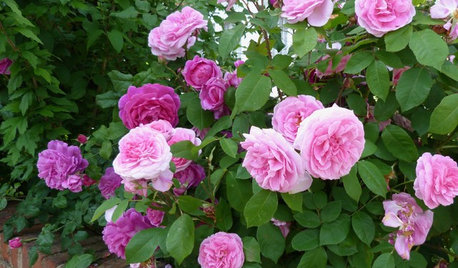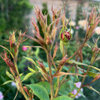Please Explain the Protocol for Using Horse Manure on Roses
Lynn-in-TX-Z8b- Austin Area/Hill Country
9 years ago
Related Stories

GARDENING GUIDESWhat Kind of Roses Should You Grow?
Want to add the beauty of roses to your garden? Find out which ones, from old-fashioned to modern, are right for you
Full Story
GARDENING GUIDESHow to Switch to an Organic Landscape Plan
Ditch the chemicals for a naturally beautiful lawn and garden, using living fertilizers and other nontoxic treatments
Full Story
FURNITUREWhy It's OK to Hate Your New Custom Sofa
It takes time to get used to bold new furniture, but dry your tears — the shock can be good for you. Here's what to expect
Full Story
GARDENING AND LANDSCAPINGLandscape Trends: Spout and Trough Fountains
The Rural Landscape Provides a Modern Form for the Garden
Full Story
HOME TECHThe Inevitable Future of Drones Around Your Home
As Google joins the push for airborne deliveries, it seems only a matter of time before neighborhoods are buzzing with drones. Is that OK?
Full Story
LIFEHouzz Call: Show Us the House You Grew Up In
Share a photo and story about your childhood home. Does it influence your design tastes today?
Full Story
GARDENING GUIDESNew Ways to Think About All That Mulch in the Garden
Before you go making a mountain out of a mulch hill, learn the facts about what your plants and soil really want
Full Story
GARDENING GUIDESGarden Myths to Debunk as You Dig This Fall and Rest Over Winter
Termites hate wood mulch, don’t amend soil for trees, avoid gravel in planters — and more nuggets of garden wisdom
Full Story
EARTH DAYThe Case for Losing the Traditional Lawn
Work less, help the environment and foster connections by just saying no to typical turf
Full Story
STUDIOS AND WORKSHOPSCreative Houzz Users Share Their ‘She Sheds’
Much thought, creativity and love goes into creating small places of your own
Full StoryMore Discussions









nikthegreek
muscovyduckling
Related Professionals
Palm Springs Landscape Architects & Landscape Designers · Woodinville Landscape Architects & Landscape Designers · McKinney Landscape Contractors · Stoughton Landscape Contractors · Haverhill Landscape Contractors · Hendersonville Landscape Contractors · Laguna Hills Landscape Contractors · Longview Landscape Contractors · Madera Landscape Contractors · Middletown Landscape Contractors · Mission Landscape Contractors · Irvington Landscape Contractors · Drexel Hill Swimming Pool Builders · Malden Swimming Pool Builders · Rancho Cordova Swimming Pool Builderscomtessedelacouche (10b S.Australia: hotdryMedclimate)
jerijen
pat_bamaz7
Lynn-in-TX-Z8b- Austin Area/Hill CountryOriginal Author
subk3
Lynn-in-TX-Z8b- Austin Area/Hill CountryOriginal Author
kittymoonbeam
cath41
sbdesign
Kippy
subk3
nikthegreek
cold_weather_is_evil
comtessedelacouche (10b S.Australia: hotdryMedclimate)
User
Lynn-in-TX-Z8b- Austin Area/Hill CountryOriginal Author
Kippy
Lynn-in-TX-Z8b- Austin Area/Hill CountryOriginal Author
Kippy
Lynn-in-TX-Z8b- Austin Area/Hill CountryOriginal Author